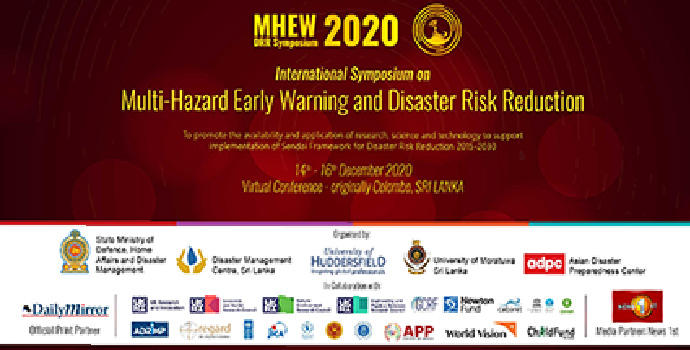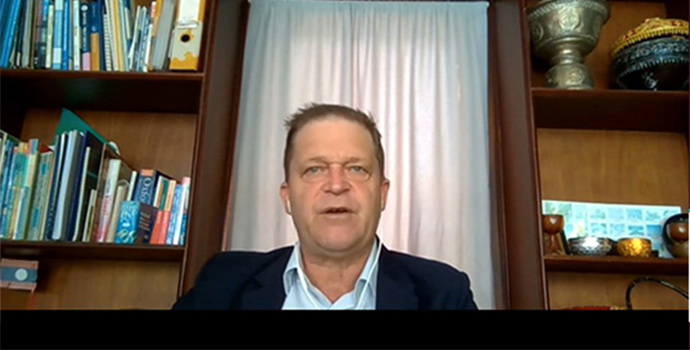- About Us
-
Who we are
-
- Publications
-
- ADPC Academy
-
MediaADPC'S NEWS
International Symposium on Multi-Hazard Early Warning and Disaster Risk Reduction calls for more efforts to link science with policy International Symposium on Multi-Hazard Early Warning and Disaster Risk Reduction calls for more efforts to link science with policy
18 - 19 Dec 2020
Colombo, Sri Lanka

The International Symposium on Multi-Hazard Early Warning and Disaster Risk Reduction concluded with the adoption of the Colombo Declaration, which calls for greater efforts to accelerate the use of science, technology and data for policy formulation, and to promote an end-to-end multi-hazard approach to early warning.
Held on 14–16 Dec 2020 in Colombo, this high-level, international symposium brought together policymakers, researchers, disaster risk practitioners, and experts from across the globe. A variety of topics were discussed during five plenaries, 20 technical sessions, and an array of keynote presentations ranging from disaster risk reduction to innovations, early warning, climate change, nature-based solutions, Sendai Framework, and preparedness, etc.
The symposium aimed to promote the availability and application of research, science, and technology to support the implementation of the Sendai Framework by exchanging knowledge and sharing good practices.
The symposium was organized by the Disaster Management Centre of the State Ministry of National Security, Home Affairs and Disaster Management,Global Disaster Resilience Center, University of Huddersfield, UK, Asian Disaster Preparedness Center (ADPC), and University of Moratuwa, Sri Lanka in association with several other agencies.
ADPC organized plenaries and presented abstracts during technical sessions. The discussion during the plenary session on "Science, Policy and Practice Nexus for Risk Analytics, Early Warning Systems, and Emergency Operations Centres (EOCs): Perspectives from the Asian Countries" revolved around good examples and opportunities. Hans Guttman, the Executive Director of ADPC, shared some examples of ADPC's work to amplify the Sendai Framework's implementation, especially the Targets E and G.

Hans Guttman, the Executive Director of ADPC, shares good examples at the MHEW DRR Symposium.
"Under Target E, ADPC, and the United Nations Office for Disaster Risk Reduction have assisted 22 countries in preparing DRR (Disaster Risk Reduction) status reports. These reports provide a snapshot of the latest DRR progress that was achieved under the four priorities of Sendai Framework," Hans shared.
About supporting the Target G of the Sendai Framework, Hans said that ADPC has been supporting end-to-end multi-hazard early warning systems and capacity strengthening for national meteorological and hydrological services in Asia and the Pacific for many decades.
Sisira Madurapperuma, Director, Preparedness for Response and Recovery, ADPC, presented a paper on Disasters, Climate Change and Development Nexus on Food Security Sector in Asia. Edwin M. Salonga, Country Program Manager, ADPC based in the Philippines, presented the findings of a literature review on "Making Early Warning Systems Inclusive: The Philippine's Experience on Persons with Disabilities in Disasters.
The 3-day symposium concluded with the adoption of the Colombo Declaration, which calls upon relevant stakeholders and development partners to commit to form and strengthen national science platforms; translate and adopt greater coherence of global frameworks into appropriate policy and practice; establish effective multi-stakeholder partnerships as mechanisms to accelerate the use of science and technology for disaster risk reduction; commit to greater accountability, protection, gender, and empowerment of the most vulnerable groups; and promote an end-to-end multi-hazard approach to early warning through appropriate legal frameworks, etc. Read the full document here.
Latest NewsRelated Trainings
-